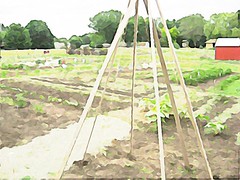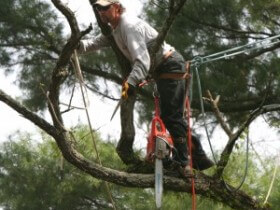Learn some tips to assist you in cultivating a beautiful garden for your personal enjoyment, your business or your family. You can have a good idea on what you need, this way you aren’t spending money on equipment you do not need, or on seeds that will not work in your environment.
Mint is a very tasty herb that has a tendency to run wild in the garden if not kept in check. You can slow their growth rate by planting them in a garden container or large pot instead. Bury the container so that your plant does not stand out. The container will keep the roots from spreading too far.
Pick the proper soil in order to get the best outcome. Depending on the type of plants you desire in your garden, your natural soil may or may not be appropriate. It can happen where one artificial area is designated to have just one type of soil.
Tools Stored
Keep your tools stored away safely if you’re in a large traffic area. A beautiful trowel or rake can be very tempting to a thief, and keeping your tools stored in a locked shed or garage will ensure that they are there next time you need them.
Every garden can benefit from a planting calendar. A planting calendar tells you which varieties you will plant in each season. You will also be able to prepare yourself ahead of time by buying the right seeds. Your calendar can be paper, or you can do it with a computer.
If growing vegetables, make sure they are in a location in your garden where they will be exposed daily to at least six hours of the sun. Most vegetables require this amount of sun in order to grow properly and at a quicker pace. Some flowers need the same thing.
Biennials and annuals are great if you would like to better your flower bed. These flowers grow quickly and can be planted at any time during the year. If you want to maintain a flower garden all year or you want to add new flowers to reflect the changing seasons, annuals and biennials are for you. You can also use these flowers to fill gaps between shrubs or perennials. Notable collections include sunflower, marigold, hollyhock, rudbeckia, cosmos, and petunia.
A combination of water and ammonia forms a spray that can rid your garden of snails. You will not damage your plants with the ammonia, and it will also produce nitrogen. It will kill the snails, though, and prevent them from damaging your plants. To get the best results, use this solution everyday.
If you are growing a vegetable garden, you may find that pests can be difficult to control. One major benefit of growing your own produce is knowing that they haven’t been treated with pesticides and other harsh chemicals. One way to control gardening pests is to be vigilant. In many cases, you can simply remove the pests from your plants by picking them off.
A little bit of research will go a long way, especially when you pair it with patience. However, while you watch something grow that you planted, the satisfaction will make it worthwhile.




